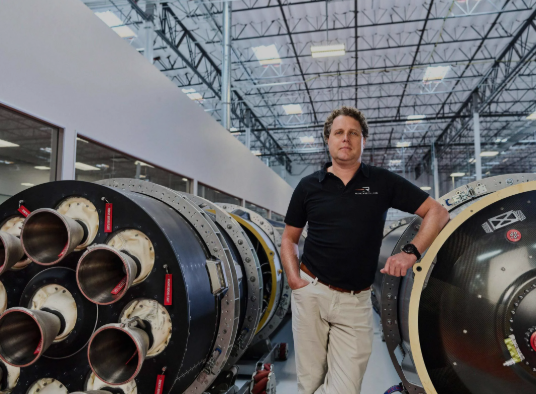Rocket Lab: How Peter Beck Launched a Dream
In the early 1990s, in Invercargill, New Zealand, Peter Beck was just a young boy fascinated with machines, speed, and the sky. He dismantled cars, added a turbocharger to the family mini, then began to tinker with rockets—water rockets, pressurized air rockets, experiments in thrust. Beck’s fascination was not just with “what moves,” but how it moved and how much further you could push it.
That curiosity led him to Fisher & Paykel, in Dunedin, where he did a tool-and-die apprenticeship. It was here that Beck’s hands-on skills sharpened. The workshops, the machines, the materials—all became his playground. If he needed a piece of titanium for a rocket prototype, he would ask the procurement department. Sometimes a small offcut or tooling scrap would make its way into his toolbox, almost as part of his apprentice “training-project.”
After hours, he built rockets. He built a rocket-powered bicycle. He built scooters, jet packs. He showed his rocket bike to Fisher & Paykel’s board parked in the company car park, lay down on it with propellant bottles between his legs, using BMX wheels to get the balance low enough. These were audacious experiments—risky, raw, but brimming with purpose.
One of the first big lessons : Environments that allow experimentation matter. Fisher & Paykel didn’t fully sanction Beck’s rocket building—but they tolerated much of it. The culture allowed him to tinker, test, break, learn. Those spare hours, those “unofficial” projects, honed skills he would need later.
The Idea That Became a Calling
While working at Fisher & Paykel and then later at Industrial Research Ltd (IRL), Beck developed technical depth—on composite materials, high-performance structures, turbines, superconductors. But one shortcoming he saw got him thinking : the aerospace world was big, glacial, not always driven to solve something Beck saw as essential—making access to space frequent, affordable, reliable.
A turning point came during a trip to the U.S.—what Beck called a “rocket pilgrimage.” He visited NASA, private aerospace companies, and thought: “If nobody is building dedicated rockets for small satellites in a way that brings costs down, why don’t I do it?” It was an idea he sketched on a napkin on the flight home, planting the seed of Rocket Lab.
Bootstrapping, Risk, and The Birth of Rocket Lab
In 2006, Beck formally founded Rocket Lab in Auckland, New Zealand. He didn’t have massive backing to start, but he had vision, engineering know-how, and an urge to build. Early funding came slowly, often from contracts and small partnerships. He met Mark Rocket, an entrepreneur whose enthusiasm matched Beck’s, and who became one of his first seed investors.
One of Rocket Lab’s first big landmark moments was in 2009: the Ātea-1 launch. Though suborbital, it made Rocket Lab the first private company in the Southern Hemisphere to reach space. It was imperfect, but it showed capability. Gradually, Rocket Lab built up more technical strength—developing the Electron rocket, their Rutherford engine (notable for 3D-printing components, electric-pump feeds, carbon composite tanks) and constructing their own launch complex in Mahia, New Zealand.
He had to lobby governments, negotiate legislation, and meet regulatory hurdles. He was never just an engineer: he became part engineer, visionary, policy navigator, manager of people—with all the messy, emotional, tactical work those roles entail.
If you’ve read NoRulebook, you’ll see echoes of those principles in Beck’s story. Here are a few parallels:
- Rejecting the assumed path: Beck didn’t follow the typical route. He didn’t finish university in aerospace (he did apprenticeships, worked hands-on). When established aerospace firms didn’t match his urgency or focus on small satellites, he stepped away rather than compromise.
- Learning by doing, improvisation: From rocket bikes to small experimentations at Fisher & Paykel, from nights and weekends building rockets, Beck grew skills in real hardware, not just in theory. He treated his early failures as learning opportunities.
- Bold vision twinned with persistence: The vision of affordable, frequent access to space was huge and seemed distant. Yet Beck didn’t waver. Despite regulatory inertia, technical setbacks, funding challenges, he kept pushing.
- Creating new rules and bending or building structures: Beck had to ask for new legislation, negotiate treaties, engage governments. He had to build infrastructure (launch pads), supply chains, technical know-how where none existed locally. He made rules where there weren’t any, or changed old ones.
Craft over glamour, engineering over show: Beck’s culture wasn’t about hype, but about making the parts, testing them, refining them, doing them again. For example, Rutherford engine development, composite tanks, repeated launches of Electron.
Why It Matters
Rocket Lab isn’t just a success story for Beck. It’s a signal that small AND bold can move mountains. That access to space can be democratized. That a person from a relatively remote place, without a glamorous Elon Musk style pedigree but with grit, skill, and relentless purpose, can change an entire industry.
It’s a story that shows how rules -Whether technical norms, industry expectations, or regulatory barriers – can be reshaped. For people who feel they don’t belong in the “established” order, Beck’s journey suggests that sometimes your best move is not to wait for permission, but to build what you believe in and bring people along. Use the tools around you, learn from each small success and failure, and keep pushing.
Takeaway Lessons
- Start with what you have: Beck used workshops, titanium scraps, apprenticeship projects. You don’t need perfect labs or big teams to begin.
- Be hands-on: You learn so much by doing. Even failures teach engineering, discipline, resilience.
- Keep the vision alive under pressure: There will be regulatory, funding, technical walls. But a clear “why” helps keep going.
- Create your own support network: Beck found or made investors, mentors, government allies. He built a culture and team that believed his vision.
- Accept that rules are often written by others, but they can be changed: If a law or regulation blocks you, learn how to engage with regulators or change the framework.










